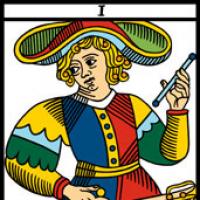Tin nhắn: 17
Nội dung: English
robinast (Xem thông tin cá nhân) 11:07:27 Ngày 09 tháng 7 năm 2009
ceigered:Interesting Harri! 2 questions:to be > olema (1. infinitive)/ olla (2. infinitive); I am > ma olen; you are (singular) > sa oled; he/she is > ta on; we are > me oleme; you are (plural) > te olete; they are > nad on
- On = to be, correct? (sounds like the Finnish olen/olet/on, e.g. minä/sinä/hän olen/olet/on pitkä = I/you/he-she am/are/is tall)
- How come in "mul on kass" and "mul on kolm kassi" the difference is in the use of the accusative?
I have a cat/ one cat / cats (in the sense not dogs or pigs f.e) > Mul on kass/ üks kass/ kassid: cat/cats is always in nominative case (singular or plural).
I have (unknown amount of) cats > Mul on kasse (plural accusative)
I have three (or some other known amount) cats > Mul on kolm kassi (singular accusative)
WHY is it so, I have no idea...

to have > omama (in a good Estonian, not in use): oman/omad/omab/omame/omate/omavad (fully regular declination).
I have, you have etc: mul/sul/tal/meil/teil/neil on. Personal pronouns are in adessive, verb form "on" does not change.
Harri.
ceigered (Xem thông tin cá nhân) 15:47:40 Ngày 09 tháng 7 năm 2009
Very interesting language though, I am always occasionally delving into a bit of Finnish so the parallels are a bit visible.
robinast (Xem thông tin cá nhân) 16:12:56 Ngày 09 tháng 7 năm 2009
ceigered:... the switching between nominative and accusative is a peculiarity/irregularity that must be learnt nonetheless?Yes, indeed - but it is quite a regular irregularity!

ceigered:... I am always occasionally delving into a bit of Finnish so the parallels are a bit visible.That's true, Estonian and Finnish are pretty close to each other. Vocabularies partly coincide and grammars are very close to each other. Anyway, the differences are big enough to make the Finnish unanderstandable for Estonians and vice versa. This way or another, learning each other's languages is easy: only a new vocabulary is to be obtained and known grammar rules slightly modified.
Harri.
Polaris (Xem thông tin cá nhân) 04:39:40 Ngày 11 tháng 7 năm 2009
That's quite a mouthful, but basically what I'm saying is that a single word (hay) which happens to be a form of "to have" (which is used as a helping verb) covers all of the "there is/there are" needs in Spanish.
yugary (Xem thông tin cá nhân) 08:26:17 Ngày 14 tháng 7 năm 2009
mnlg (Xem thông tin cá nhân) 09:07:10 Ngày 14 tháng 7 năm 2009
yugary:to say "I have a many friends" you'd say the equivalent of "To me there are many friends."This mechanism is quite common among languages. I recall Latin employing it, alongside habeo-habere.
ceigered (Xem thông tin cá nhân) 10:10:01 Ngày 14 tháng 7 năm 2009
mnlg:And Japanese, if I recall, has a similar method.. But the Japanese method translates more to "regarding me, (possessed-object) exists"yugary:to say "I have a many friends" you'd say the equivalent of "To me there are many friends."This mechanism is quite common among languages. I recall Latin employing it, alongside habeo-habere.






